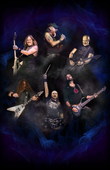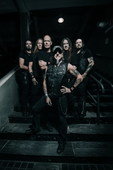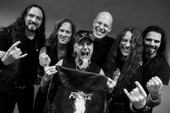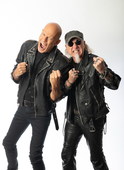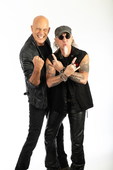Accept
Our Response To The Current Situation
28.01.2021
Архив интервью | Русская версияTeutonic heavy metal titans Accept are not new to coming under fire: they’ve been criticized even by the most die-hard fans on many occasions, but would always come out stronger than before. Just remember their two splits with charismatic singer Udo Dirkschneider and keep in mind the venues they still play – or rather played, before the pandemic. This time the problems were caused by the departure of long-term bassist Peter Baltes, leaving guitarist Wolf Hoffmann the only member of the classic line-up in the current incarnation of the band, and the stint with symphonic orchestras for a live album and tour, which sounded “not enough metal” to those who prefer aggression to melody and “Fast As A Shark” to “Winter Dreams”. The band is about to respond to all these points of criticism with the new album, “Too Mean To Die”, and while the release is not yet out there, we’re reaching out to Wolf to learn what he thinks about the Accept’s current standing.
You recorded this new album remotely, with yourself in the United States and Andy Sneap, the producer, in England. How much did this format complicate the process? Did you actually like the studio experience this time?
Eh, it made it possible, but it didn’t help anything, it was just a way for us to deal with the situation and to make sure we can actually finish the recording of this album. Of course, it is always better to be in the same room with somebody than it is to see them on a computer screen, with connection getting lost and all that. It’s sort of like what we’re doing right now – it works, but I guess it would be a whole lot more relaxed if we were just sitting together in the same room. You can see each other, you can see facial expressions, I don’t know… just the fact that you have to make an appointment, and “hello can you hear me?”, this whole thing, you know… (everybody laughs)
Andy Sneap has been producing all Accept records since your comeback. How would you describe his contribution to the band?
That’s an interesting question. These things, like everything else in life, they kind of shift a little bit over time. For instance, for the very first album (“Blood Of The Nations”, 2010) he was right there during the selection and writing process, he basically heard the very first demos we had just collected, and weren’t even quite ready to call it an album or start recording, we were just basically at the very beginning. He heard the first ideas, and he picked out what he liked, and he told us, “The other stuff is just not good, forget about it. Do this, don’t do that. Do more of this, don’t do so much of that”. That alone helped so much because we got a sort of direction and identity for the new Accept right away with his help. That was probably the biggest help we’ve got from him. Of course, during the recording of the first album we learned to work together, we learned how he works, and he learned from us how we write songs and how we are thinking and all that kind of stuff. Over time, I think, we’ve gotten to know each other so well that he came a little bit our way, and we came his way. It’s definitely getting better and easier every time, and at this point he feels like a part of the family. Which, by the way, helped a lot during this crazy last bit of recording. We knew what he was thinking, what he was going for, and he could trust us enough, we could do a bunch of stuff alone without him and just send him the files. There was a lot of mutual trust, I guess.
Some of your bandmembers are based in Germany, at least Uwe Lulis (guitar) is, and we don’t know about Martin Motnik (bass)…
Martin is actually based here in Nashville here, too.
OK, did you record Uwe remotely as well?
Yeah-yeah. In general, we all play a part in this album’s production, but we never really tell exactly who played what on which song, because I think at the end of the day it’s nobody’s business, so to say. I compare making an album to making sausage. It’s nobody’s business how you make sausage as long as it tastes good. You don’t really wanna know everything. (laughs)
Accept have added a couple of new guys last year – Martin and also Philip Shouse (guitar). Why did you choose these particular musicians? We’re sure you had a great variety of people willing to play in Accept…
Yeah. I’ll start with Phil. Uwe was not available for the orchestra tour we did, so we found a sit-in, or a temporary replacement from Nashville, a musician who was friends with our drummer Christopher Williams. We took Phil on this tour and we discovered what an amazing talent he is, and what a true professional he is, and how easy he is to get along with. It doesn’t hurt that he looks really good on stage and he knows what he’s doing, so we really enjoyed working with him. After the tour was over, we thought it would be a shame it we just sent him back home and never see him again. Why can’t we have him and Uwe in the band? Why does it have to be only two? It can be three if we want to. We basically tried it out during a few shows in the fall of 2019 in South America, and it didn’t only sound awesome, it also worked great onstage. Everybody was happy, and we thought, “It’s slightly unusual, but let’s have a third guitar player!” Knowing this, we made sure that on this new album there’s a lot of space and enough spots where he can shine and contribute. There’s actually quite a lot of solos that he played, and we played a lot of twin solos and that kind of thing.
Martin Motnik was a huge find right around the corner, a German living in Nashville. He basically heard through the Internet that Peter had left the band, so he applied for the job, and we tried him out, and he was chosen. He was chosen for that orchestra project as well, so he’s been in the band longer, but we’ve known both of the guys for the same amount of time.
“The Undertaker”, your first single off “Too Mean To Die”, is a pretty dark song for Accept. Why did you decide it’s the best song to introduce the new album to the fans?
I don’t know, it’s a tough question. Is there ever a best song, and is there a song that is 100 percent representative of the whole album? No, there is never. We just chose this song because it felt very complete and very well rounded, we felt it was interesting enough, but at the same time, it’s got a lot of typical elements of Accept stuff, the groove and the backing vocals, and it sounds very much like Accept to me. At the same time when you have a topic about an undertaker, it’s gonna be dark, it can’t be happy or anything. I thought the song is interesting. Actually Mark (Tornillo, vocals) wrote the lyrics first for that song, and then he gave me the lyrics, and I wrote the song to the finished lyrics, and I tried to be as dark and spooky and eerie as I could to fit the mood of the topic.
By the way, did COVID have any impact on the actual songs and lyrics, or were all of them written before the pandemic? The album starts with the song “Zombie Apocalypse”, which seems quite fitting to the current times…
Yeah, you could think that, but they’ve got nothing to do with each other. We wrote a lot of that stuff before COVID ever happened. When it did happen, we decided we were not gonna write any songs in response to it, because we though that at some point people had heard enough of COVID, and they can’t hear it anymore. It’s on the news every day, and maybe the last thing they need is yet another song that this situation. We used this statement, “Too Mean To Die”, as our response to the current situation in an, of course, not deadly serious way, it was meant to be a metal statement and a funny take on things where we say, “We’re too mean to die, we’re the metal warriors, and nothing can ever kill us” – just as a joke kind of thing, but at the same time, it’s a very metal statement to make in these dark times.
In the case of “Zombie Apocalypse”, you would think it’s about zombies, but it’s really not. It’s about people walking down the streets with their cell phones at hand, and being addicted to technology and looking like zombies.
Yeah, it’s a very familiar picture! (everybody laughs)
Exactly! All you have to do is just go to an airport, and everyone, including me, we all walk around like zombies.
By the way, you already have a song called “Pandemic”, it’s from the “Blood Of The Nations” album, and it’s 10 years old. It sounds quite prophetic if you look back at it now, don’t you think?
I know, it’s crazy. We were visionaries. So people said, “Stop writing songs about these scenarios!” (everybody laughs) Some people said, “You wrote ‘Pandemic’ 10 years ago, does it mean that we’ll have a zombie apocalypse in 10 years from now”? I hope not.
Now that touring is no longer possible, you obviously have much more time on your hands. What do you do outside the band these days? Have you returned to photography maybe?
No, I have not, but I started doing projects that I had wanted to for a long time, and one of them was to go through my instrument collection and start getting rid of some of that stuff. The stuff that I always thought about like, “One day I’m gonna do it”, and now it’s one day. I think we all have found projects that we always wanted to do, some people learned a language or cleaned up their house - I don’t know, people find stuff to do in these weird times, and I’m sure it’s the same in Russia. Everybody has a long list of things that they’ve always wanted to do and never had enough time. I’m probably gonna start writing some more music soon, maybe collecting some classical ideas for a future album, I don’t quite know yet. I’ve been quite busy with this album until now, and I’ve also been working around the house… I’m really hungry to get back to a musical project of some sort; now that the album is done, I’m already thinking ahead – what’s next?
Let’s now go back to the touring days. Last year you did an orchestral tour, and we would like to know your impressions about it. What did you like most about it, and was there anything that you didn’t like?
Musically and artistically, it was the most fulfilling thing I’ve ever done in my life. I think this is one of the projects from my bucket list, of which I always thought, “Before I die, I’d love to do that”. I did it now, and that was super-fulfilling, just the whole artistic experience, and the sound of the orchestra, and to play guitar with all these amazing musicians. That was brilliant, and I wish I could do that more, but what I don’t miss is how complicated and how involved it is logistically. You know, you gotta plan these things so meticulously, and nothing can ever go wrong, there’s no room for spontaneity, you can’t ever do anything just because you want to. “Let’s do this real quick” – nothing is real quick with an orchestra, everything is written in stone, rehearsed beforehand, and the score has to be written months in advance. It’s all planned out like a military operation.
Your setlist for the tour included a couple of very interesting choices – such songs as “Kill The Pain” and “Shades Of Death” had very seldom been played live before. How did they end up on the setlist?
Well, obviously, you go by which songs will benefit the most from the orchestra treatment. “Kill The Pain” was one of the songs that we always liked on the album, because it had strings and it had a big arrangement on the album, but when you play it with just two guitars, it kind of doesn’t do the song justice. I thought, “In this case we have a big sounding orchestra, so this is the way to present that song”. Other than that, we went through the Accept catalogue thinking there’s a few songs we should always play – “Balls To The Wall”, for example. I don’t think we can ever do a show without playing that song, but does it really need an orchestra? No! But there are some other songs like “Shadow Soldiers”, for instance, that sounded beautiful with orchestra, because it was already quite melodic in its original composition, so it really benefitted from that. “Dark Side Of My Heart” is another one that was really brought to a whole another level.
In general, did this orchestral experience influence your songwriting?
No, not so much. I’ve always written slightly classically influenced, and I didn’t write anything in particular for an orchestra on this album. Actually funny enough, there isn’t any strings on this album at all, it’s a pure metal album. In general, when I write songs for Accept, I try to write them so that they’re not for my own personal pleasure or experience, they’re gontta be written for Accept, in the tradition of Accept, and I try to be totally loyal to the long history and the sound of Accept. I leave stuff away if that’s just not fitting.
Do you have any plans to repeat this experience, not next year, but in like five years from now? Or is one time enough for you?
For the moment I’ve had enough, but that doesn’t mean I’m not gonna do it again. Like I said, it’s very rewarding, but at the same time very complicated. We’ll have to wait and see, maybe if there is enough interest… It’s not really so much about me, it’s also about the promoters, the people who book these shows. When this touring situation goes back to normal, we’ll talk about it if the time comes. Personally I would love to do it, it’s always been a lot of fun.
While you were busy with the orchestra, your former singer David Reece had a tour where he was performing the entire “Eat The Heat” album. This is quite surprising – back in the day it didn’t have the success you were hoping for, but now if he’s doing such shows, it means that 30 years later there are people who want to hear it. What’s your opinion of such a change of heart among the public?
Honestly I have no idea how successful this tour really was. I heard it was cancelled after just a few shows, so I don’t really have a good answer. I don’t think it was anything worth talking about. Was it really a successful tour, what do you think?
We don’t know about its success, but if promoters are interested, we don’t think they’re just throwing their money away…
Yeah, you would think that, but sometimes promoters, you know, make wrong choices.
Now, coming back to the present - some musician has recently said that releasing an album during the pandemic is like throwing it into a black void. It’s like you release it, and nothing happens afterwards. Do you have in mind any ways to keep the album visible after the release date, any ways to promote it, as long as there are no concerts in sight?
(sighs) That’s a million dollar question that nobody can really answer. We haven’t done this before, we’ve always had an album and then a tour to support the album. But we went ahead and released the album because we figured that the album is ready, the audience is out there, and they probably wanna hear the album. Does it really help anybody if we wait until some time in the future and hold it all back? This way at least if the people can’t come to the shows, they can buy the album or listen to the album and enjoy it at home or wherever they are. And then one day we will tour together. But holding everything back – I don’t know if that’s the right answer. Maybe people are still gonna come to the shows afterwards and maybe they’re still gonna buy the album without a tour. I hope people will respond well, so far we get great responses – anyhow, it’s gonna come out, and we’ll have to wait and see what happens.
Mark Tornillo said in the summer that you recorded something like 15 or 16 songs for the album, but the final tracklist only contains 11. Do you have any plans for doing anything with the rest of the material?
Well, we didn’t really finish all these other songs. We started working on a bunch of them, and halfway through we decided that they were not as strong as the rest. I think there’s one song we finished that’s not on the album, I’m trying to think, I can’t remember now, but there’s a bunch of others that could be possibly in the pipeline for later use, absolutely.
Have you been approached, or have you considered doing anything like livestreams or socially distanced shows?
No, we haven’t, and we probably won’t. Because I feel an Accept show depends so much on the audience participation, it really only works if the audience gets excited, which inspires the band, and the band plays better, and the audience responds, so this is back and forth between the audience and the band. The idea of playing to a bunch of cameras imagining the audience that is out there is such a strange idea to me, so foreign, I don’t think it’s gonna be anything worthwhile. It’s never gonna be a substitute for a real show, so I think it’s better to wait until we can do it properly. And I’ve heard about bands doing shows for a 100 people in a driving theater – that’s gonna be strange, too. There’s no PA, people sit in their cars, and listen to the song on a car stereo – what the hell? And then “show me your hands” – windshield wipers or what? (everybody laughs) It seems so strange, I don’t know what to think of it.
Reporters keep asking you how you like living in the United States and whether you have any plans to come back to Germany, and you have always said “no”. Has this very turbulent year changed your opinion? The United States seem to be a pretty difficult place right now…
For a far away, it certainly has that appearance, I would agree. If I was watching the news in Russia, I would probably think it’s crazy out here. But I’ll tell you the truth, and it’s always been my life experience – when you actually go to a country and you live there, it’s completely different from what it appears to be from a distance. I’ll tell you, it’s crazy politically, but my life is just as quiet as ever, it’s the same really. I’ve had a similar experience with the difference between perception and reality, I’ve gone to countries that were supposedly in a civil war, Ukraine or whatever. You think that you cannot even land a plane there, it’s all gonna be bombed out, and the whole city is in ruins when you see the news. But then you go there, and everything is business as normal, people are walking down the streets, eating ice-cream, and you think like, “Where is the war?” I know it’s out there somewhere, I know there’s tragedy, I’m not playing that down, I’m just saying the perception from the outside is always so much different than when you’re actually there. That’s because the news is so selective, they always focus on bad things and catastrophes and whatnot, and where I live, nothing has changed.
Our last question: what will be the first thing you will do after the pandemic is officially over?
Ahhh…. I will say hooray! I will go on tour for sure. I will play a concert, I will get my guitar and run to the airport, that’s what I’ll do.
Accept on the Internet: https://www.acceptworldwide.com/
Special thanks to Maxim Bylkin (Soyuz Music) for arranging this interview
Interview by Roman Patrashov, Natalia “Snakeheart” Patrashova
Photos courtesy of Soyuz Music
November 13, 2020
© HeadBanger.ru
